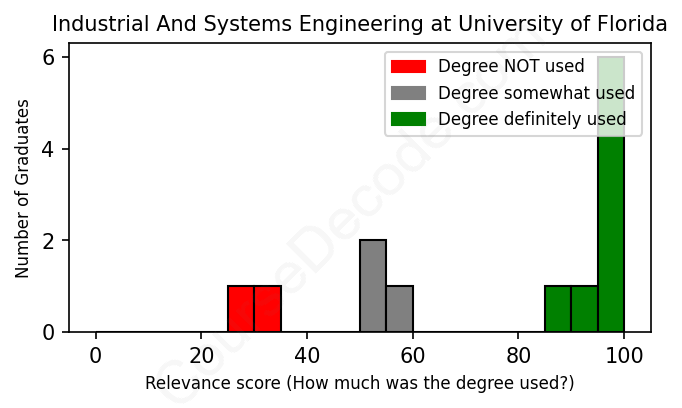
First, some facts. Of the Industrial And Systems Engineering graduates from University of Florida we've analyzed , here's how many have used (or NOT used) their degree in their career:

These are estimates based on AI analysis of 13 LinkedIn profiles (see below).
The verdict? Above average. Overall, with an average relevance score of 75%, Industrial And Systems Engineering graduates from University of Florida have a higher likelihood (+8%) of finding work in this field compared to the average graduate across all fields:
And for comparison, here's the chart for all profiles we've looked at across all degrees.
Also, after graduating, only 15% of these graduates have pursued further education other than another Bachelor's degree (such as a Masters degree or other), compared to the average across all profiles of 35%. This suggests a Bachelors degree is enough for most Industrial And Systems Engineering graduates, and it's normal to look for work straight after graduation.
See the details:
|
Relevance score: 29% We think this person has NOT gone into a career related to their degree. We think this person has NOT gone into a career related to their degree.
DEGREE INFOGraduated in 2015 from University of Florida with a Bachelor of Science (B.S.) in Industrial And Systems Engineering. No other secondary education since. JOB HISTORY SINCE GRADUATIONProcess Improvement Consultant UF Health Aug 2015 - Dec 2015 Area manager 1  Amazon Jan 2016 - Apr 2017 Area manager 2  Amazon Apr 2017 - Sep 2017 Operations Manager  Amazon Sep 2017 - Jan 2018 Senior Operations Manager  Chewy Feb 2018 - Dec 2018 Distribution Center Manager  Phillips Pet Food & Supplies Jan 2019 - Nov 2019 Distribution Center Manager  Phillips Pet Food & Supplies Nov 2019 - Nov 2021 Director Of Operations  Spreetail Nov 2021 - Sep 2022 Retail Process Improvement Engineer  Publix Super Markets Oct 2022 - Present ABOUTNo information provided. |
The top 10 most common jobs done by the graduates we've analyzed (ranked most common to least) are:
After looking through the LinkedIn profiles of people who graduated with a degree in Industrial and Systems Engineering from the University of Florida, it’s clear that a lot of them ended up in roles that involve operations, management, or process improvement. Most commonly, these graduates found positions such as Operations Managers, Area Managers at Amazon, and various Engineering roles. These positions seem to really lean on the skills they acquired during their degree, like optimizing systems, managing processes, and improving efficiency. For example, roles at Amazon and in healthcare settings often require applying systematic approaches and engineering principles to ensure that operations run smoothly.
However, not every job is a perfect fit. Some roles, like Sales Engineer or Customer Support Consultant, while they may utilize some soft skills or analytical abilities gained during their studies, don't fully harness the engineering knowledge directly. Overall, many graduates have been able to find positions where they can effectively apply their Industrial and Systems Engineering skills, particularly in sectors focused on operations and process improvement. That said, there are still a notable number of positions that seem more management-focused, which might not tap into the core engineering principles they learned, but still benefit from the analytical mindset they developed in school. So, in short, it seems like many graduates are doing a solid job in roles relevant to their degree, but there's a mix of positions that vary in their direct relevance to Industrial and Systems Engineering principles.
Here is a visual representation of the most common words in job titles for Industrial And Systems Engineering graduates (this is across all Industrial And Systems Engineering graduates we've analyzed, not just those who went to University of Florida):

Looking at the career trajectories of graduates from the Industrial and Systems Engineering program at the University of Florida, it seems like many of them have found solid and relevant positions right after graduation and continued to grow in their careers over the years. For their first jobs, you'll notice that a lot of them start in roles like operations manager, process engineer, or manufacturing engineer, often in well-known companies such as Amazon, Nielsen, and Procter & Gamble. This shows that graduates are stepping into positions that leverage their skills in optimizing processes, efficiency, and systems thinking, which is exactly what their degree prepares them for.
As they progress five or ten years later, many of these graduates move up the ladder into more senior roles, such as directors or managers, still within operations or engineering fields. They typically stay in industries that align with their educational background, showing a consistent theme of leveraging their industrial and systems engineering expertise. Even though some have diversified into unique roles, like statistical forecasting or project management, they still tend to resonate with their core skills learned in school. Overall, it paints a pretty positive picture: graduates are generally thriving in their careers, finding relevant opportunities where they can apply their knowledge and climbing the professional ladder successfully.
Honestly, getting a Bachelor’s degree in Industrial and Systems Engineering at the University of Florida can be pretty challenging, but it really depends on your interests and strengths. This major usually involves a good mix of math, science, and engineering concepts, so if you’re not super into those subjects, it might feel tougher. You'll have to tackle subjects like statistics, operations research, and systems modeling, plus hands-on projects that can be time-consuming. That said, if you’re passionate about problem-solving and optimization, you might find yourself enjoying the coursework. Overall, it’s a demanding degree, maybe a bit harder than average, so be prepared to put in some serious effort!
Most commonly, in the LinkedIn profiles we've looked at, it takes people 4 years to finish a Bachelor degree in Industrial And Systems Engineering.
So, looking at these profiles of Industrial and Systems Engineering grads from the University of Florida, it seems like they’re doing pretty well financially. A lot of them worked for big companies like Amazon, Nielsen, and Procter & Gamble, which usually come with decent salaries and benefits—especially in roles like Operations Managers and Directors. Even those who started out in internships or as entry-level engineers seem to have moved up the ladder pretty quickly. With many of them holding managerial positions and some even in leadership roles not long after graduation, it definitely gives off a vibe that they’re making a solid income. Overall, it looks like these folks have landed some good gigs and are likely earning respectably, so yeah, it’s safe to say they're probably doing just fine financially!
Here is a visual representation of the most common words seen in the "about" section of LinkedIn profiles who have a Bachelor degree in Industrial And Systems Engineering (this is across all Industrial And Systems Engineering graduates we've analyzed, not just those who went to University of Florida). This may or may not be useful:

Here are all colleges offering a Bachelor degree in Industrial And Systems Engineering (ordered by the average relevance score of their Industrial And Systems Engineering graduates, best to worst) where we have analyzed at least 10 of their graduates:
| College | Score | Count |
|---|---|---|
 The Ohio State University The Ohio State University
|
88 | 17 |
 Virginia Tech Virginia Tech
|
85 | 12 |
 Georgia Institute of Technology Georgia Institute of Technology
|
78 | 13 |
 University of Florida University of Florida
|
75 | 13 |
 Virginia Polytechnic Institute and State University Virginia Polytechnic Institute and State University
|
71 | 12 |